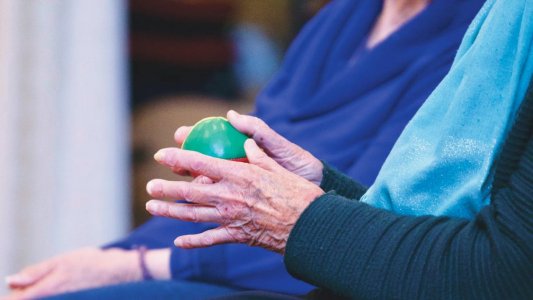No need for ‘spreadsheets and evidence’, aged care operators told amid reports of failing food standards
- Replies 13
Aged care operators are set to receive an added $3 billion in funding for improvements in their services, which include providing better food for seniors but where is that money actually going?
Two-thirds of aged care operators said they spent $14 per resident daily on average, while a third — about 833 operators — admitted to spending less than $10. Two per cent spent a measly $6 daily.
But a report found that the Department of Health told aged care operators ‘We are not asking you to provide us with spreadsheets or evidence that supports your answers.’
The ‘answers’ refer to how much these facilities claim they spend on providing food for residents. So are they even telling the truth?
In place of food-related expense breakdowns, aged care providers will have to answer two questions quarterly about how they spend money on on-site and off-site food preparations.

‘You are expected to keep a record of how you calculate the information you provide us,’ the department added.
But for Health Economist and former Health Secretary Stephen Duckett, the development is bad news for transparency.
‘I don't think without a clear audit trail, without the spreadsheets and so on, you can be fooled that they actually did spend the money on this,’ he said.
A spokesperson for Aged Care Minister Richard Colbeck explained that the mechanism for reporting food spending will be expanded once the new funding system for aged care is introduced.
Meanwhile, some are in disbelief at how little aged care operators spend on food.
Celebrity chef Maggie Beer, an advocate for better food in aged care facilities, stressed it wasn’t possible to provide three (nutritious) meals and snacks for $10 a day.
‘We have a responsibility to look after those in aged care, those that are no longer able to look after themselves in that way,’ she said.
‘To me, it's just totally unacceptable.’
In the 2021 national budget, the government provided an extra $10 daily for food per aged care facility resident after a Royal Commission into Aged Care Quality and Safety report revealed concerning findings on seniors’ food and nutrition.
The report also uncovered issues regarding the federal government and the aged care sector’s transparency on how public taxpayer money was being spent.
Then-Treasurer Josh Frydenberg assured the public in an interview last year that more improvements were on the way through ‘hundreds of extra audits’ annually.
‘There's going to be new powers for the regulators, a more coordinated system to ensure that the money being spent is getting to the residents.’ he said.

The 883 aged care facilities spending less than $10 on food per resident daily are under monitoring by the Aged Care Quality and Safety Commission, according to the Department of Health.
The ABC shared that the commission found 41 of the 883 — just five per cent — had been audited so far, with three failing food standards for aged care. According to a commission spokesperson, decisions remain pending for other audited aged care operators.
As the commission’s audit progresses, albeit slowly, the proper food and nutrition intake of seniors in aged care facilities hangs in the balance.
The same problems hounding the aged care sector for decades can still be seen now, according to Anne Shneyder of Nutrition Professionals Australia.

‘I see things like … the evening meal, where cheaper or low-protein items are served,’ she pointed out.
‘Things like little pies and pasties, things like fish patties with not much fish in them … dim sims, tinned spaghetti.’
Hopefully, the situation improves for the thousands of seniors in aged care homes.
If you or anyone you know has a complaint related to aged care facility conditions, you may reach the Aged Care Quality and Safety Commission on 1800 951 822.
You may also reach the Older Persons Advocacy Network here or at 1800 700 600.
For more on food in the aged care sector, you might find this story on a different approach using the Montessori method interesting. You could also revisit how Prime Minister Anthony Albanese vowed to address issues surrounding aged care.
What is your reaction to this story? What improvements do you think aged care service providers should make? Have you witnessed below-average standards of care?
Tell us your thoughts and opinions below!
Source: YouTube/ABC Australia
Two-thirds of aged care operators said they spent $14 per resident daily on average, while a third — about 833 operators — admitted to spending less than $10. Two per cent spent a measly $6 daily.
But a report found that the Department of Health told aged care operators ‘We are not asking you to provide us with spreadsheets or evidence that supports your answers.’
The ‘answers’ refer to how much these facilities claim they spend on providing food for residents. So are they even telling the truth?
In place of food-related expense breakdowns, aged care providers will have to answer two questions quarterly about how they spend money on on-site and off-site food preparations.

Past investigations have found food provided by aged care operators lacking. Credit: Facebook/Aged Care Food
‘You are expected to keep a record of how you calculate the information you provide us,’ the department added.
But for Health Economist and former Health Secretary Stephen Duckett, the development is bad news for transparency.
‘I don't think without a clear audit trail, without the spreadsheets and so on, you can be fooled that they actually did spend the money on this,’ he said.
A spokesperson for Aged Care Minister Richard Colbeck explained that the mechanism for reporting food spending will be expanded once the new funding system for aged care is introduced.
Meanwhile, some are in disbelief at how little aged care operators spend on food.
Celebrity chef Maggie Beer, an advocate for better food in aged care facilities, stressed it wasn’t possible to provide three (nutritious) meals and snacks for $10 a day.
‘We have a responsibility to look after those in aged care, those that are no longer able to look after themselves in that way,’ she said.
‘To me, it's just totally unacceptable.’
In the 2021 national budget, the government provided an extra $10 daily for food per aged care facility resident after a Royal Commission into Aged Care Quality and Safety report revealed concerning findings on seniors’ food and nutrition.
The report also uncovered issues regarding the federal government and the aged care sector’s transparency on how public taxpayer money was being spent.
Then-Treasurer Josh Frydenberg assured the public in an interview last year that more improvements were on the way through ‘hundreds of extra audits’ annually.
‘There's going to be new powers for the regulators, a more coordinated system to ensure that the money being spent is getting to the residents.’ he said.

Over a million senior Australians used aged care services from 2019-2020, according to the Australian Institute for Health and Welfare. Credit: Pexels/Matthias Zomer
The 883 aged care facilities spending less than $10 on food per resident daily are under monitoring by the Aged Care Quality and Safety Commission, according to the Department of Health.
The ABC shared that the commission found 41 of the 883 — just five per cent — had been audited so far, with three failing food standards for aged care. According to a commission spokesperson, decisions remain pending for other audited aged care operators.
As the commission’s audit progresses, albeit slowly, the proper food and nutrition intake of seniors in aged care facilities hangs in the balance.
The same problems hounding the aged care sector for decades can still be seen now, according to Anne Shneyder of Nutrition Professionals Australia.
Key Takeaways
- A report found that aged care operators were told by the Department of Health they didn't need to provide breakdowns of how much they claimed to spend on food for seniors.
- They were, however, told to keep how they calculate of their expenses.
- The government released an additional $3 billion to improve services for seniors in aged care homes across the country, including providing better and more nutritious meals for residents.
- A survey revealed that a third of aged care operators claimed spending $10 per aged care facility resident daily.
- Some have criticised the amount as too low and impossible to provide nutritious food on.
- There are lingering concerns that food seniors are served in aged care homes lacks proper nutrients and nourishment.
‘Things like little pies and pasties, things like fish patties with not much fish in them … dim sims, tinned spaghetti.’
Hopefully, the situation improves for the thousands of seniors in aged care homes.
If you or anyone you know has a complaint related to aged care facility conditions, you may reach the Aged Care Quality and Safety Commission on 1800 951 822.
You may also reach the Older Persons Advocacy Network here or at 1800 700 600.
For more on food in the aged care sector, you might find this story on a different approach using the Montessori method interesting. You could also revisit how Prime Minister Anthony Albanese vowed to address issues surrounding aged care.
What is your reaction to this story? What improvements do you think aged care service providers should make? Have you witnessed below-average standards of care?
Tell us your thoughts and opinions below!
Source: YouTube/ABC Australia







